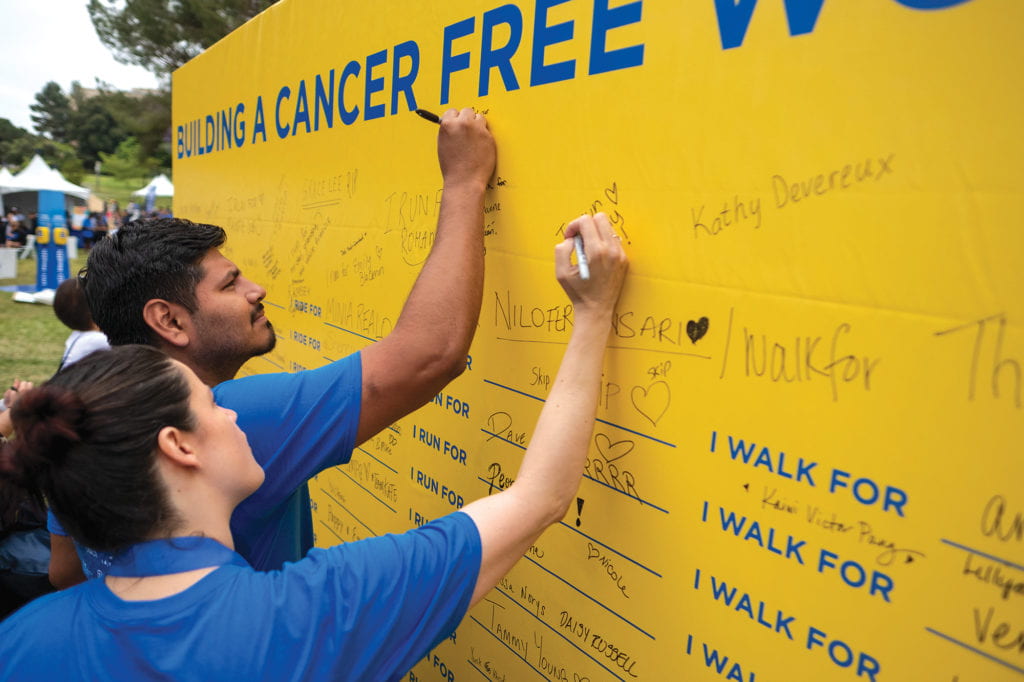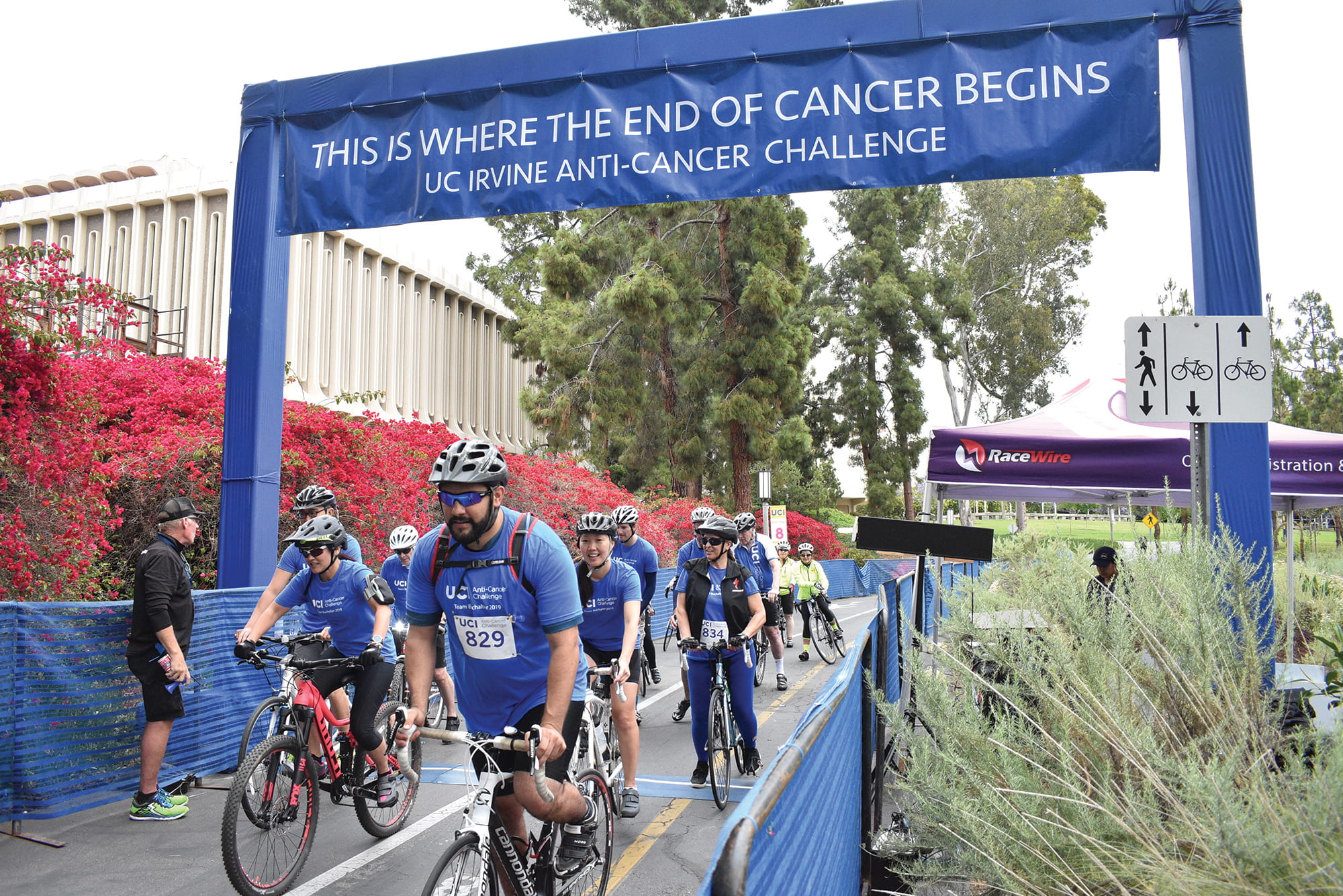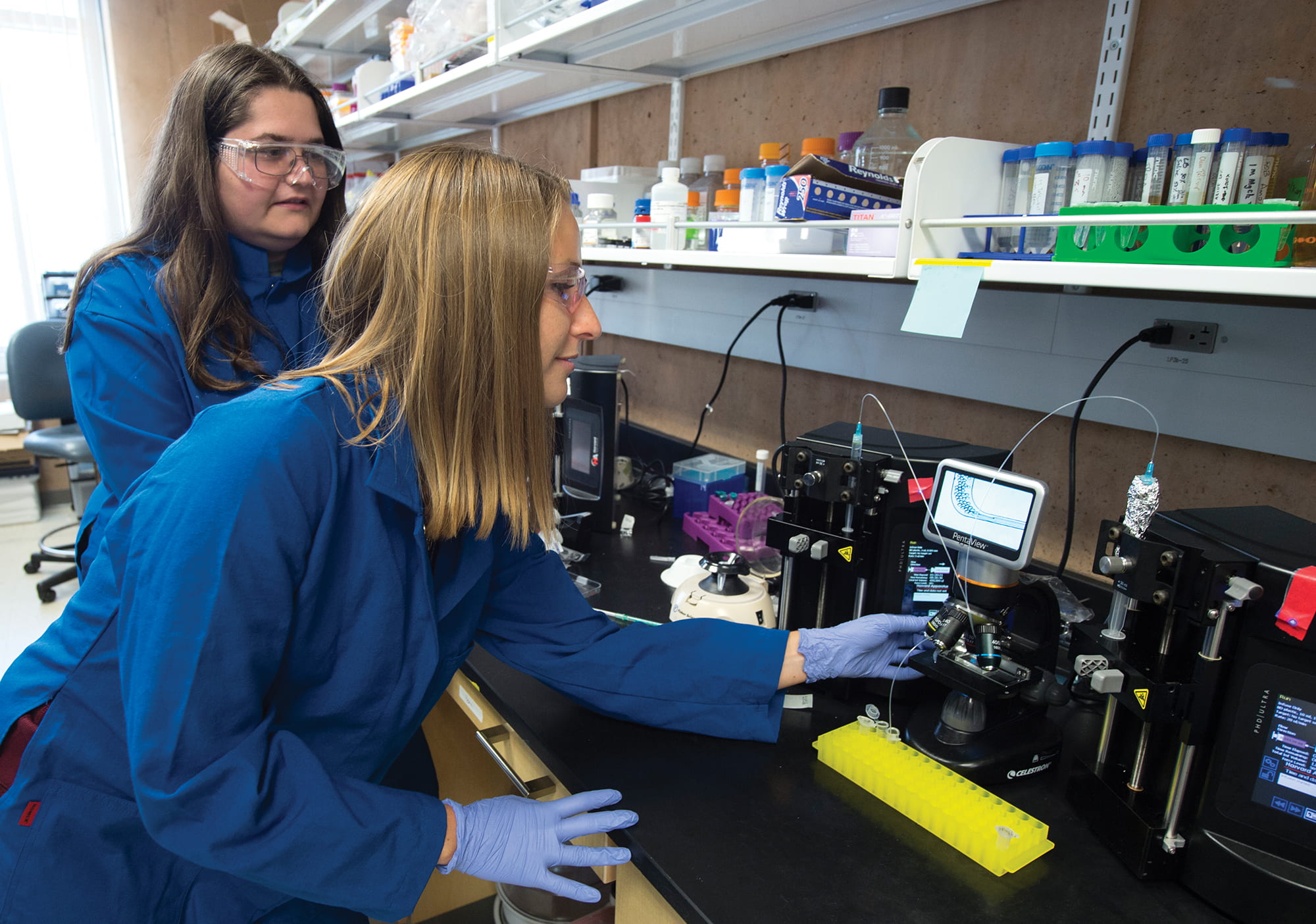Turning Grief Into Action
UCI’s Anti-Cancer Challenge mobilizes Southern California residents in push for new treatments
The loss of a loved one from cancer is an experience far too many people understand. But rare are the individuals who channel their grief into action. Shawn Miller and Ronit Benjamin are two such people.
As executive council co-chairs of the annual UCI Anti-Cancer Challenge, Miller and Benjamin not only donate to the cause but ask others to do the same. The Anti-Cancer Challenge is a community movement culminating in an annual bike ride and run/walk to raise money for UCI Health’s Chao Family Comprehensive Cancer Center and its pediatric affiliate, CHOC Children’s Hospital. The peer-to-peer nature of the event means that people sign up and pledge to solicit donations from their friends, family members, and business and social contacts.
“I beg my friends to give money – which I hate – but they know I’m doing it in my father-in-law’s honor,” says Benjamin, 49, who joined the Anti-Cancer Challenge two years ago after her husband’s father, Dror Benjamin, died of leukemia three weeks shy of his 80th birthday. He had been planning to take his entire extended family on a vacation later that year.

“He was larger than life,” says Benjamin, who has three children with her husband, Gil. “He was a very good person. He helped a lot of people quietly. He did a lot in his life. Then cancer took him.”
Such stories of love and loss abound at the Anti-Cancer Challenge. The fundraiser, which began in 2017, includes 14-, 35-, 60- and 100-mile bicycle rides and 5K and 10K run/walks. It was founded by Dr. Richard Van Etten, a UCI Health hematologist-oncologist and director of the Chao Family Comprehensive Cancer Center, arising from his concern over cutbacks in the amount of federal funding for cancer research. Cancer is the second leading cause of death in the United States, responsible for about 21 percent of deaths.
All money raised by the event, which was held on campus June 8 (and will be held next year on June 6), goes directly to support cancer research at UCI, including translational projects that can lead to rapid improvements in treatment. Modest grants are allocated for the kind of high-risk, high-reward research that’s often overlooked by the federal government and other funding organizations, Van Etten says.
These studies “are really the only way to move the needle forward in finding better ways to care for cancer patients,” he notes. “They generate critical preliminary data that will draw larger awards from elsewhere.”
In fact, Van Etten adds, the small grants “have a return on investment of about 20 to 1. So every dollar that somebody contributes has the impact of $20. I think that’s a very powerful message.”
Expanding the Challenge
That message impressed Miller, a successful businessman who organized the largest 2019 team and became the first person in Anti-Cancer Challenge history to raise more than $100,000. The 53-year-old CEO of 5 Arch Funding Corp. has also been buffeted by cancer, losing his mother and several other family members to various forms of the disease. Recently, his wife, Marci, learned that a relative has breast cancer.
On Miller’s 50th birthday, Marci’s gift to him was to establish the Miller Family Research Fund. It was a way, he says, to commit to a cause over a long period of time, nurturing the fund’s growth and involving his four children. While searching for worthy recipients of their philanthropy, Miller met with Van Etten and Caroline Pereira, executive director of development for cancer programs at UCI, and vowed to work with them in launching a movement.
“We told Richard we’re can-do people,” he says. “Giving money is one thing, but helping build an enterprise is more important to us. We wanted to build something at UCI that will have its own legs and will stand without us at some point. To me, the most important thing is to get other people involved.”
And he has – in a big way. Miller tapped into his network of employees, friends and relatives to put together this year’s 169-person Miller family team, which sported orange-and-white “Kick Cancer” T-shirts.
“The best part, to me, was just walking and seeing all of our friends,” he says of the empowering occasion, “and knowing they were all there for an important cause.”
Benjamin was unable to attend this year’s event but co-hosted, with Miller, a pre-event Anti-Cancer Challenge fundraiser sponsored by the Monarch Beach Resort in Dana Point, bringing in nearly $100,000. The dinner was prepared by celebrity chef Michael Mina, with support from the Monarch Beach Resort and other benefactors.
“It was beautiful,” Benjamin says. “I feel like the Anti-Cancer Challenge is in a baby stage, and we can continue to grow it.”
Translating Research Into Patient Care
Both Miller and Benjamin say they direct their philanthropy to UCI because of the high quality of research, the scientists who conduct it and the way donations are handled. Miller notes that every $40,000 raised is enough to fund a promising research project.
To date, Anti-Cancer Challenge grants have supported more than two dozen original research approaches to preventing, diagnosing or treating cancer. Some of the trials will be open to UCI Health patients, giving them early access to treatments that may well represent the future standard of care.

Among the 2018 recipients is Rémi Buisson, assistant professor of biological chemistry, who is looking at a substance known as A3B that’s a major driver of gene mutations in ovarian cancer. Understanding how A3B does this could lead to new strategies for targeting those types of ovarian tumors. Late-stage ovarian cancer has one of the poorest survival rates of all cancers.
Another project, under the direction of Dr. Krishnansu Tewari, a gynecological oncologist, will explore the gut microbiome in patients with gynecological cancers being treated with immunotherapy to identify which bacteria may be associated with better responses to the protocol. Immunotherapy has revolutionized the treatment of some kinds of cancer, but the technique still doesn’t work for a majority of patients.
These sorts of studies – and the scientists themselves – are inspirational, Benjamin says.
“I’m very proud to be a part of the Anti-Cancer Challenge,” she says. “I really hope we make a change. I know that sometimes with fundraisers, you don’t know where the money goes. Here, I know it goes to innovative research that may lead to better treatments.”
And when one of those research projects results in a major discovery – and one or more will – the thousands of Anti-Cancer Challenge participants, volunteers and donors will have had a hand in it, Miller notes.
That’s the payoff, he says, adding: “Everyone needs to support this cause.”



